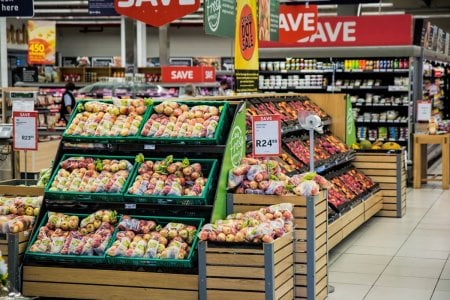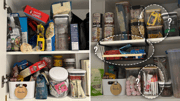Which foods to save your wallet and waistline, according to experts!
As we all know, grocery prices have skyrocketed recently. A block of cheese costs upwards of $8, and tomatoes can be more than $10 a kilo! So maintaining a diet filled with whole, minimally processed foods can be pretty expensive. It can feel like saving money and eating healthily are often at odds, but fear not, dear Seniors Discount Club members! We've got some expert tips on where you can save on your weekly shopping without compromising your nutrition.

Nutritionist Susie Burrell has shared which supermarket foods could be unnecessarily draining your wallet while also not offering much nutrition. These items often find their way into our shopping carts out of habit, but it's time to reassess our spending choices, focus on our health, and stick to our budget. Let's delve into the top supermarket food items experts recommend avoiding purchasing.
Though it might seem time-consuming, the time spent preparing and packing meals during your designated day or two of meal prep will come in handy during the week. You’ll avoid unnecessary trips to the store and save time and energy during the week. Additionally, consistent meal planning can help your grocery budget and reduce food waste. When you have a planned list of recipes and ingredients, you are less likely to impulse buy items that don’t align with your budget or that you may not end up eating.
Effective meal planning and bulk cooking require careful preparation and a bit of strategy. Make sure to shop with an eye on how each ingredient recipe could be applied to more than one meal to minimise the number of ingredients needed. Additionally, be mindful of the freezer and refrigerator space you have available, as you may need to plan accordingly to store the additional dishes you make.
Not only can you save money by meal prepping, but you can also ensure that you and your family are eating healthy and quality food while taking stress and hassle out of meal time each day.
 Paying attention to the contents of your grocery cart and making more informed choices can save you money and improve your overall health. With a little savvy shopping, you can save your budget and your wellbeing! Happy shopping!
Paying attention to the contents of your grocery cart and making more informed choices can save you money and improve your overall health. With a little savvy shopping, you can save your budget and your wellbeing! Happy shopping!

Nutritionist Susie Burrell has shared which supermarket foods could be unnecessarily draining your wallet while also not offering much nutrition. These items often find their way into our shopping carts out of habit, but it's time to reassess our spending choices, focus on our health, and stick to our budget. Let's delve into the top supermarket food items experts recommend avoiding purchasing.
1. Fresh milk
We all want to support our local farmers and buy fresh Aussie produce. However, long-life milk is often a more affordable option that still provides a similar nutritional profile in terms of protein and calcium. It's also easier to buy in bulk when discounted and can save you from worrying about constantly running out of milk or wasting expired fresh milk.2. Margarine
Margarine is essentially a blend of heavily refined oils, offering little nutritional value. Other more natural alternatives can help lower cholesterol without adding processed vegetable oil to your diet. Better options include nut butter or avocados, negating the need to spend $6 to $8 on a tub of margarine.3. Blocks of cheese
Who doesn't love cheese? However, when cheddar blocks cost between $8 and $10, this once-staple item now feels like a luxury. Consider purchasing shaved or grated varieties, which usually offer a more favourable price point. As an added bonus, you'll likely use less grated cheese while still enjoying its flavour, and you won't be throwing away that hardened end of the block.4. Chips
Despite their convenience, pre-packaged frozen chips are more expensive than their homemade counterparts and often contain added fats and flavourings. By making your own, you can control the quality of oil and serve a more nutritious chip at half the price.5. Dips
It's tough to resist a delicious platter of dips, crackers, and cheese. However, many supermarket dips are high in fat and contain unnecessary additives like vegetable oil. When shopping for dips, check the labels and look for options made from vegetables or higher-quality oils.6. Crumbed chicken
While they might appear more affordable, crumbed chicken products typically contain only 50-60% chicken, with the rest being fillers and thickeners. Opt instead for fresh chicken breast and make your own breadcrumbs using leftover wholegrain bread – it's both healthier and more delicious!7. Rice snacks
Processed rice snacks offer minimal nutritional value and are often packed with additives and artificial flavours. Healthier, less-processed alternatives at a similar price point include edamame beans, popcorn, lentil bites, and roasted legumes.The Benefits of Bulk Cooking and Meal Planning
Bulk cooking and meal planning are two of the most effective strategies to both save money on groceries and ensure the quality and healthiness of the food you are eating. It involves setting aside a designated day or two during the week to cook multiple meals at once and portion them out for the upcoming days. An added bonus is that as you plan ahead, you’ll also have the opportunity to incorporate healthy ingredients in each meal.Though it might seem time-consuming, the time spent preparing and packing meals during your designated day or two of meal prep will come in handy during the week. You’ll avoid unnecessary trips to the store and save time and energy during the week. Additionally, consistent meal planning can help your grocery budget and reduce food waste. When you have a planned list of recipes and ingredients, you are less likely to impulse buy items that don’t align with your budget or that you may not end up eating.
Effective meal planning and bulk cooking require careful preparation and a bit of strategy. Make sure to shop with an eye on how each ingredient recipe could be applied to more than one meal to minimise the number of ingredients needed. Additionally, be mindful of the freezer and refrigerator space you have available, as you may need to plan accordingly to store the additional dishes you make.
Not only can you save money by meal prepping, but you can also ensure that you and your family are eating healthy and quality food while taking stress and hassle out of meal time each day.
Key Takeaways
- Nutritionist Susie Burrell shares tips on grocery items that are a waste of money and suggests cost-saving alternatives for a healthier diet.
- Burrell recommends purchasing long-life milk, which is cheaper, lasts longer, and has a similar nutritional profile to fresh milk.
- For a healthier and more cost-effective option, she suggests ditching margarine for nut butter or avocado and avoiding heavily processed crumbed chicken, chips, and dips.
- Burrell also warns against buying rice snacks, which contain additives and have limited nutritional value and recommends edamame beans, popcorn, or roasted legumes instead.







